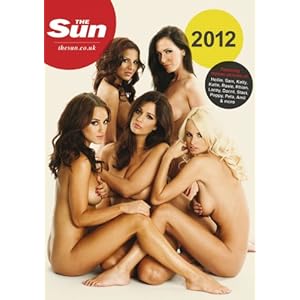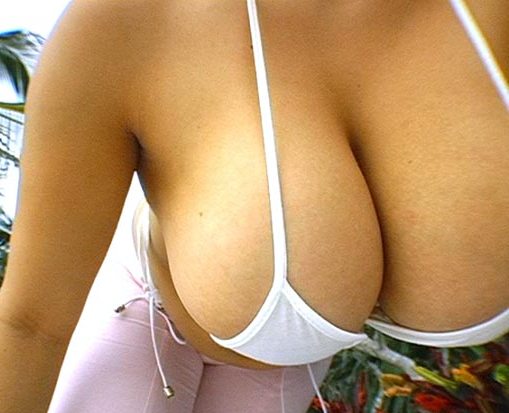 Well for men it seems really quite simple. Generally chests are always ok, if not they display signs to tell them:
Well for men it seems really quite simple. Generally chests are always ok, if not they display signs to tell them:
For women the rules are very complicated:

The water has to have waves though, the same rules don't apply to say a river or lake; there it would be indecent for a female to remove her top..
 In hot weather it's acceptable to wear a bikini top, but it has to be made of a Lycra type material and be suitable for swimming. Otherwise it's considered only OK for underneath clothes, you wouldn't answer the door or head out wearing only this item - this would be considered "indecent".
In hot weather it's acceptable to wear a bikini top, but it has to be made of a Lycra type material and be suitable for swimming. Otherwise it's considered only OK for underneath clothes, you wouldn't answer the door or head out wearing only this item - this would be considered "indecent". Certain newspapers have a special page to show off the uncensored breasts they decide are OK for people to see, but breasts are never shown on other pages. More of these "vetted and ok" breasts can be found in magazines - but if they're on the cover the nipples are covered. Also, breasts including nipples, as adverts to sell things seem to be OK too...
Certain newspapers have a special page to show off the uncensored breasts they decide are OK for people to see, but breasts are never shown on other pages. More of these "vetted and ok" breasts can be found in magazines - but if they're on the cover the nipples are covered. Also, breasts including nipples, as adverts to sell things seem to be OK too...
 What seems to cause the most upset otherwise is the nipple. Although it looks very similar to a man's, it seems to be very offensive. If this is covered, almost anything goes...unless you are famous and have sheer fabric and then you can show nipple too.
What seems to cause the most upset otherwise is the nipple. Although it looks very similar to a man's, it seems to be very offensive. If this is covered, almost anything goes...unless you are famous and have sheer fabric and then you can show nipple too.
The rules on the Internet are very confusing indeed - one website "Facebook" has declared breasts that do not show nipple are OK, but then they remove pictures of breasts without nipples and leave other nipples on there. I'm not sure whether even they really know what is and isn't OK.
Why the breasts are on show seems to be an important factor. If it's just for fun that seems to be OK, whereas generally they seem to get more upset if the woman is feeding her baby.
 As you can imagine, feeding babies can be very difficult with all these rules, but they get round this by making plastic copies of the breast and silicone copies of nipples (which are considered "decent"). Because mums want to go out and about, this often means they use these replicas frequently, so some fill them with a powder made from whey, a by-product of the manufacture of cheese - which then gets modified so babies can tolerate it. Now most babies are fed this way after the first few weeks, and the women who want to give their own milk often struggle to find someone to help if they have a problem. Some who want to give their own milk use a large apron called a nursing cover to ensure they are "modest". Others suggest mums should express their milk and feed back via the plastic copy breast so as to ensure not a flash of breast is seen.
As you can imagine, feeding babies can be very difficult with all these rules, but they get round this by making plastic copies of the breast and silicone copies of nipples (which are considered "decent"). Because mums want to go out and about, this often means they use these replicas frequently, so some fill them with a powder made from whey, a by-product of the manufacture of cheese - which then gets modified so babies can tolerate it. Now most babies are fed this way after the first few weeks, and the women who want to give their own milk often struggle to find someone to help if they have a problem. Some who want to give their own milk use a large apron called a nursing cover to ensure they are "modest". Others suggest mums should express their milk and feed back via the plastic copy breast so as to ensure not a flash of breast is seen.Our culture is infected and obsessed with sexual objectification (thanks to patriarchy).PS the rest of the blog post is well worth a read, just click through the link.
Hence, women's body’s are constantly deemed as being inappropriate when dressed or presented in a certain manner (something that is apparently open to personal interpretation). Men are taught that they’re entitled to our bodies, on many different levels, and women are shamed and blamed when they’re attacked/sexually harassed. [sic]
In fact our culture has gone so far the other way, some suggest exposure to breasts can cause all sorts of problems.... (click the link to see more!) and some consider a picture like that on the link disgusting Well no actually the text with the image discusses nudity, and the writer appears to be discussing discussing genitals (confused? I was!) ....I'm not sure what they were up to during biology class, but my money isn't on listening.
Perhaps most interesting of all, is whilst many Americans feel:
"Increasingly, in the United States, women are pressed to wear burkas. Such level of submission and servitude is un-American, and undermines women's rights to equality and better quality of life" (Facebook group - Americans againt Burkhas)
Nobody considers breast coverage to be vaguely comparable. Nobody argues for equality on the old chest front. Nobody spots the irony....



 - which then gets modified so babies can tolerate it. Now most babies are fed this way after the first few weeks, and the women who want to give their own milk often struggle to find someone to help if they have a problem. Some who want to give their own milk use a large apron called a nursing cover to ensure they are "modest". Others suggest mums should express their milk and feed back via the plastic copy breast so as to ensure not a flash of breast is seen.
- which then gets modified so babies can tolerate it. Now most babies are fed this way after the first few weeks, and the women who want to give their own milk often struggle to find someone to help if they have a problem. Some who want to give their own milk use a large apron called a nursing cover to ensure they are "modest". Others suggest mums should express their milk and feed back via the plastic copy breast so as to ensure not a flash of breast is seen.

















